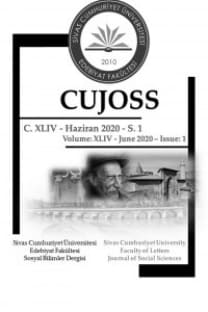Duygusal Uyarıcıların Uyaran Keşfi Üzerindeki Etkisi
Keşif etkisi, bir tanıma görevi sırasında test maddelerinin değişimlenerek sunulması (anagram şeklinde ya da tersten gösterilerek vs gibi) sonucu kişilerin daha fazla olumlu tepki vermesine neden olan bir bellek yanılgısıdır. Bu araştırmada keşif etkisi, duygusal ve nötr sözcükler açısından incelenmiştir. Sonuçta, duygusal uyarıcıların nötr olanlardan farklı olarak, aşinalık hissine dayanan bellek yanlılığını önleyerek keşif etkisi yaratmadığı görülmüştür. Araştırma sonuçları, keşif etkisinin kaynak belleği belirsizliğinden kaynaklanan bir cevap yanlılığı olduğu yönündeki açıklamaları desteklemektedir. Sonuçlar, duygusal test maddelerinin nötr olanlar karşısında cevap yanlılığı yaratma üstünlüğü açısından yani, belleğin temel işleyişi açısından değerlendirilmiştir.
Anahtar Kelimeler:
Keşif Etkisi, Tanıma, Duygusal Bellek
Revelation effect refers to a memory bias that people are more likely to judge items as old if they were manipulated and then revealed during a recognition test. In this study, revelation effect was examined in terms of emotional and neutral words. In result, it was found that because emotional stimulus inhibited a memory bias dependent of feeling of familiarity it did not create the revelation effect. The research results supported the explanations in the direction of that the revelation effect is an answer bias resulting from some uncertainty in source memory. The results were evaluated in terms of advantages of emotional test items against neutral ones.
Keywords:
Revelation Effect, Recognition, Emotional Memory.,
___
Arntz, A., De Groot, C. ve Kindt, M. (2005). Emotional memory is perceptual. Journal of Behavior Theraphy and Experimental Psychiatry, 36, 19-34.Baran, Z. (2011). Genç, Yaşlı ve Alzheimer Tipi Demanslı grupların Duygusal Bellek Performansları Açısından Karşılaştırılması. Yayınlanmamış Doktora Tezi, Hacettepe Üniversitesi, Sosyal Bilimler Enstitüsü, Ankara.
Buchanan, T.W. (2007). Retrieval of emotional memories. Psychological Bulletin, 133, 761-77
Cameron, T. E., & Hockley, W. E. (2000). The revelation effect for item and associative recognition: Familiarity versus recollection. Memory & Cognition, 28, 176– 18
Frigo, L. C., Reas, D. L., & LeCompte, D. C. (1999). Revelation without presentation: Counterfeit study list yields robust revelation effect. Memory & Cognition, 27, 339–343.
Hamann, S. (2001). Cognitive and neural mechanisms of emotional memory. Trends in Cognitive Sciences, 5, 394-400.
Hicks, J. L., & Marsh, R. L. (1998). A decrement-to-familiarity interpretation of the revelation effect from forced-choice tests of recognition memory. Journal of Experimental Psychology: Learning, Memory, and Cognition, 22, 1105–1120. Isen, A.M. (1985). The asymmetry of happiness and sadness in effects on memory in normal college students. Journal of Experimental Psychology: General, 114(3), 388-391.
Kensinger, E.A. ve Corkin, S. (2003). Memory enhancement for emotional words: Are emotional words more vividly remembered than neutral words? Memory and Cognition, 31(8), 1169-1180.
Kensinger, E.A. (2007). Negative emotion enhances memory accuracy: Behavioral and neuroimaging evidence. Current Directions in Psychological Science, 16, 2132
LeCompte, D. C. (1995). Recollective experience in the revelation effect: Separating the contributions of recollection and familiarity. Memory and Cognition, 23, 3243
Leigland, L.A., Schulz, L.E. ve Janowsky, J.S.(2004). Age related changes in emotional memory. Neurobiology of Aging, 25, 1117-1124.
Luo, C. R. (1993). Enhanced feeling of recognition: Effects of identifying and manipulating test items on recognition. Journal of Experimental Psychology: Learning, Memory, and Cognition, 19, 405–414.
Niewiadomski, M. W., & Hockley, W. E. (2001). Interrupting recognition memory: Tests of familiarity-based accounts of the revelation effect. Memory & Cognition, 29, 1130-1138.
Ochsner, K.N. (2000). Are affective events richly recollected or simply familiar? The experience and process of recognizing feelings past. Journal of experimental Psychology: General, 129(2), 242-261.
Peynircioglu, Z. F., & Tekcan, A. I. (1993). Revelation effect: Effort or priming does not create the sense of familiarity. Journal of Experimental Psychology: Learning, Memory and Cognition, 19, 382–388.
Rajaram, S. (1993). Remembering and knowing: Two means of access to the personal past. Memory & Cognition, 21, 89–102.
Ramponi, C., Handelsman, G. ve Barnard,P.J. (2010). The memory enhancement effect of emotion is absent in conceptual implicit memory. Emotion, 10(2), 294-299. Slotnick, S. D. (2010). Remember source memory ROCs indicate recollection is a continuous process. Memory, 18(1), 27-39.
Talmi, D. ve Moscovitch, M. (2004). Can semantic relatedness explain the enhancement of memory for emotional words? Memory and Cognition, 32(5), 742-751.
Tekcan, A.İ. ,& Peynircioğlu, Z. F. (2001) Keşif etkisi: Yüzlerin tanınmasında test koşullarının etkisi. Türk Psikoloji Dergisi, 16,, 57-68.
Tosun, A. ve Dağ, İ. (2000). Depresif Duygu Durumu Olan ve Olmayan Kişilerin, Örtük Bellek Görevinde Duygu Durum Tutarlı Bellek Yanlılığı Açısından Karşılaştırılması. Türk Psikoloji Dergisi, 15, 29-39.
Watkins, M. J., & Peynircioglu, Z. F. (1990). The revelation effect: When disguising test items induces recognition. Journal of Experimental Psychology: Learning, Memory, and Cognition, 16, 1012–1020.
Westerman, D. L. (2000). Recollection-based recognition eliminates the revelation effect in memory. Memory & Cognition, 28, 167–175.
Westerman, D. L., & Greene, R. L. (1998). The revelation that the revelation effect is not due to revelation. Journal of Experimental Psychology: Learning, Memory, and Cognition, 24, 377–386.
Westerman, D. L., & Greene, R. L. (1996). On the generality of the revelation effect. Journal of Experimental Psychology: Learning, Memory, and Cognition, 22, 1147-1153.
Whittlesea, B. W. A., & Williams, L. D. (2001). The discrepancy-attribution hypothesis: I. The heuristic basis of feelings of familiarity. Journal of Experimental Psychology: Learning, Memory, and Cognition, 27, 3–13.
- ISSN: 1305-5143
- Yayın Aralığı: Yılda 2 Sayı
- Yayıncı: Sivas Cumhuriyet Üniversitesi Edebiyat Fakültesi
Sayıdaki Diğer Makaleler
Küreselleşmenin Küçük Kentlere Yansıması Bağlamında Kastamonu ve Bölgesel Kalkınma Deneyimi
Duygusal Uyarıcıların Uyaran Keşfi Üzerindeki Etkisi
Yazılı ve Sözlü Kaynaklara Göre Türkiye Selçukluları Devrinde Kayseri’de Şeyh ve Dervişler
L’Analyse du Temps et de L’Espace dans La Curée de Zola
19. Yüzyıl Sonlarında Çankırı'da Eğitime Dair
Under Western Eyes (Batılı Gözler Altında) adlı romanındaki başkarakteri
Osmanlı Vergi Sisteminde Reform ve Temettü’ Vergisi
